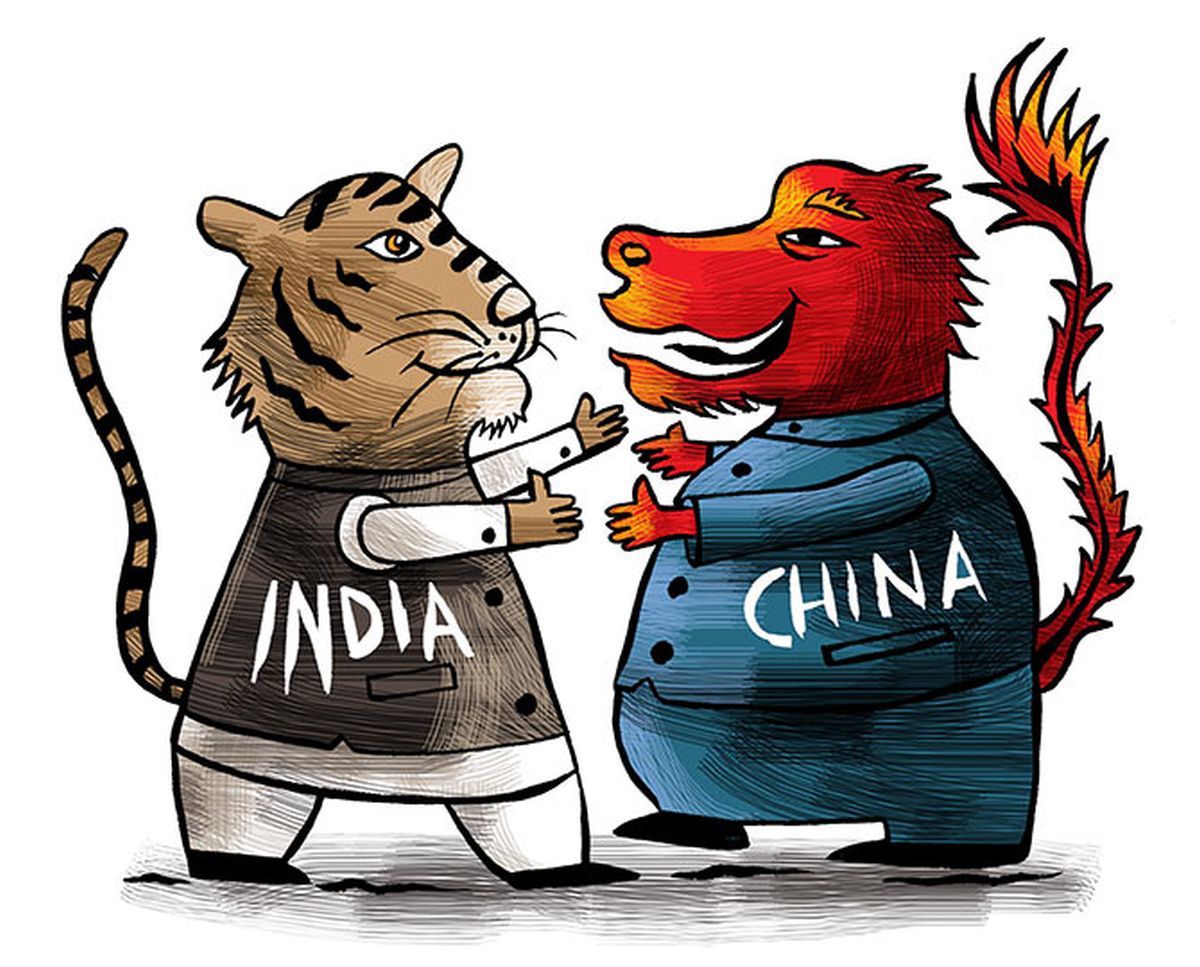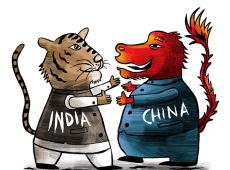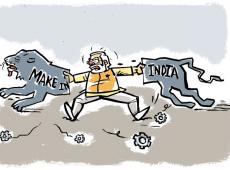Chinese Investment in India: Boosting Local Manufacturing?
By Bijay Kumar Singh, New Delhi Aug 04, 2024 11:05
Niti Aayog member Arvind Virmani suggests attracting Chinese firms to invest in India for manufacturing instead of relying on imports. This move could benefit India's export market and address trade imbalances.

Illustration: Uttam Ghosh/Rediff.com
New Delhi, Aug 4 (PTI) Niti Aayog member Arvind Virmani on Sunday said it is better for India to get Chinese firms to invest and produce goods here to boost local manufacturing than to keep importing goods from the neighbouring country.
Virmani was responding to a pitch made by the pre-budget Economic Survey on July 22 for seeking foreign direct investment (FDI) from China to boost local manufacturing and tap the export market.
"So, there is a trade-off the way an economist looks at it...So, the trade-off is that if there are going to be some imports, which we are anyway going to import for 10 years, 15 years from China, then it is better to get Chinese firms to invest in India and produce the same goods here," he told PTI in an interview.
As the US and Europe are shifting their immediate sourcing away from China, it is more effective to have Chinese companies invest in India and export the products to these markets rather than importing from the neighbouring country, according to the Economic Survey.
"So, in effect, we have to look at each good one at a time, you know, each category of good one at a time, and evaluate that trade-off," the eminent economist added.
The survey noted that India faces two choices to benefit from the 'China plus one strategy' -- it can integrate into China's supply chain or promote FDI from China.
"It is the trade-off...instead of keeping on import from them (China). We should allow it," Virmani opined.
"Among these choices, focusing on FDI from China seems more promising for boosting India's exports to the US, similar to how East Asian economies did in the past.
"Moreover, choosing FDI as a strategy to benefit from the China plus one approach appears more advantageous than relying on trade. This is because China is India's top import partner, and the trade deficit with China has been growing," it has added.
China stands at the 22nd position with only 0.37 per cent share (USD 2.5 billion) in the total FDI equity inflow reported in India from April 2000 to March 2024.
The ties between the two countries nosedived significantly following the fierce clash in the Galwan Valley in June 2020 that marked the most serious military conflict between the two sides in decades.
The Indian and Chinese militaries have been locked in a stand-off since May 2020, and a full resolution of the border row has not yet been achieved, though the two sides have disengaged from several friction points.
India has been maintaining that its ties with China cannot be normal unless there is peace in the border areas.
Following these tensions, India has banned over 200 Chinese mobile apps like TikTok, WeChat, and Alibaba's UC browser. The country has also rejected a major investment proposal from electric vehicle maker BYD.
However, earlier this year, the Competition Commission of India (CCI) cleared JSW Group's proposed acquisition of a 38 per cent stake in MG Motor India Pvt Ltd.
MG Motor India is a wholly-owned subsidiary of Shanghai-headquartered SAIC Motor.
Though India has received minimal FDI from China, the bilateral trade between the two nations has grown multi-fold.
China has emerged as the largest trading partner of India with USD 118.4 billion two-way commerce in 2023-24, edging past the US. India's exports to China rose 8.7 per cent to USD 16.67 billion in the last fiscal.
The main sectors that recorded healthy growth in exports to that country include iron ore, cotton yarn/fabrics/made-ups, handloom, spices, fruits and vegetables, plastic and linoleum.
Imports from the neighbouring country increased 3.24 per cent to USD 101.7 billion. The trade deficit widened to USD 85 billion in the last fiscal year from USD 83.2 billion in 2022-23.
According to the Commerce Ministry data, China was India's top trading partner from 2013-14 till 2017-18 and 2020-21. Before China, the UAE was the country's largest trading partner. The US was the largest partner in 2021-22 and 2022-23.
Virmani was responding to a pitch made by the pre-budget Economic Survey on July 22 for seeking foreign direct investment (FDI) from China to boost local manufacturing and tap the export market.
"So, there is a trade-off the way an economist looks at it...So, the trade-off is that if there are going to be some imports, which we are anyway going to import for 10 years, 15 years from China, then it is better to get Chinese firms to invest in India and produce the same goods here," he told PTI in an interview.
As the US and Europe are shifting their immediate sourcing away from China, it is more effective to have Chinese companies invest in India and export the products to these markets rather than importing from the neighbouring country, according to the Economic Survey.
"So, in effect, we have to look at each good one at a time, you know, each category of good one at a time, and evaluate that trade-off," the eminent economist added.
The survey noted that India faces two choices to benefit from the 'China plus one strategy' -- it can integrate into China's supply chain or promote FDI from China.
"It is the trade-off...instead of keeping on import from them (China). We should allow it," Virmani opined.
"Among these choices, focusing on FDI from China seems more promising for boosting India's exports to the US, similar to how East Asian economies did in the past.
"Moreover, choosing FDI as a strategy to benefit from the China plus one approach appears more advantageous than relying on trade. This is because China is India's top import partner, and the trade deficit with China has been growing," it has added.
China stands at the 22nd position with only 0.37 per cent share (USD 2.5 billion) in the total FDI equity inflow reported in India from April 2000 to March 2024.
The ties between the two countries nosedived significantly following the fierce clash in the Galwan Valley in June 2020 that marked the most serious military conflict between the two sides in decades.
The Indian and Chinese militaries have been locked in a stand-off since May 2020, and a full resolution of the border row has not yet been achieved, though the two sides have disengaged from several friction points.
India has been maintaining that its ties with China cannot be normal unless there is peace in the border areas.
Following these tensions, India has banned over 200 Chinese mobile apps like TikTok, WeChat, and Alibaba's UC browser. The country has also rejected a major investment proposal from electric vehicle maker BYD.
However, earlier this year, the Competition Commission of India (CCI) cleared JSW Group's proposed acquisition of a 38 per cent stake in MG Motor India Pvt Ltd.
MG Motor India is a wholly-owned subsidiary of Shanghai-headquartered SAIC Motor.
Though India has received minimal FDI from China, the bilateral trade between the two nations has grown multi-fold.
China has emerged as the largest trading partner of India with USD 118.4 billion two-way commerce in 2023-24, edging past the US. India's exports to China rose 8.7 per cent to USD 16.67 billion in the last fiscal.
The main sectors that recorded healthy growth in exports to that country include iron ore, cotton yarn/fabrics/made-ups, handloom, spices, fruits and vegetables, plastic and linoleum.
Imports from the neighbouring country increased 3.24 per cent to USD 101.7 billion. The trade deficit widened to USD 85 billion in the last fiscal year from USD 83.2 billion in 2022-23.
According to the Commerce Ministry data, China was India's top trading partner from 2013-14 till 2017-18 and 2020-21. Before China, the UAE was the country's largest trading partner. The US was the largest partner in 2021-22 and 2022-23.
Source: PTI
DISCLAIMER - This article is from a syndicated feed. The original source is responsible for accuracy, views & content ownership. Views expressed may not reflect those of rediff.com India Limited.
You May Like To Read
TODAY'S MOST TRADED COMPANIES
- Company Name
- Price
- Volume
- GTL Infrastructure
- 2.89 (+ 4.71)
- 121757816
- G V Films
- 0.91 (+ 2.25)
- 76902965
- Srestha Finvest
- 2.26 (+ 4.63)
- 55617757
- Vodafone Idea L
- 16.11 (+ 0.75)
- 46855004
- Suzlon Energy Ltd.
- 71.44 (+ 4.98)
- 30765378
MORE NEWS

Telangana IT Exports Surge 11% to Rs 2.68 Lakh...
Telangana's IT sector witnessed robust growth in FY24, with exports reaching Rs 2.68...

Trai's Stricter Telecom QoS Norms: COAI...
Telecom regulator Trai's new quality of service norms with stricter provisions have...

BCCL Pays First Dividend: Rs 44 Cr to CIL
Bharat Coking Coal Limited (BCCL) paid its inaugural dividend of Rs 44.43 crore to Coal...












 © 2024 Rediff.com India Limited. All rights reserved.
© 2024 Rediff.com India Limited. All rights reserved.